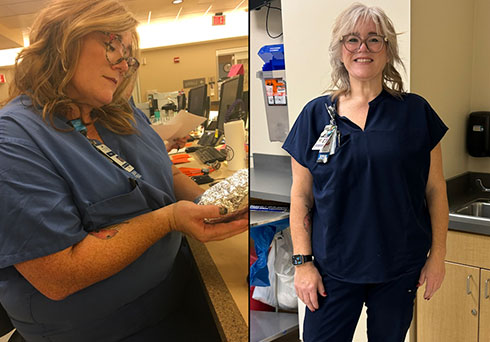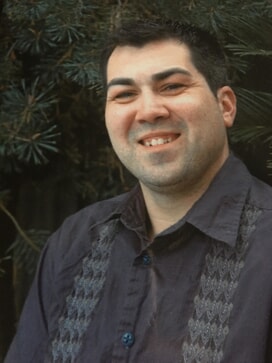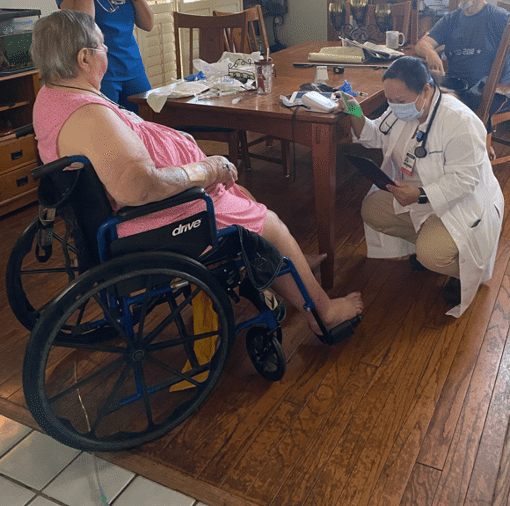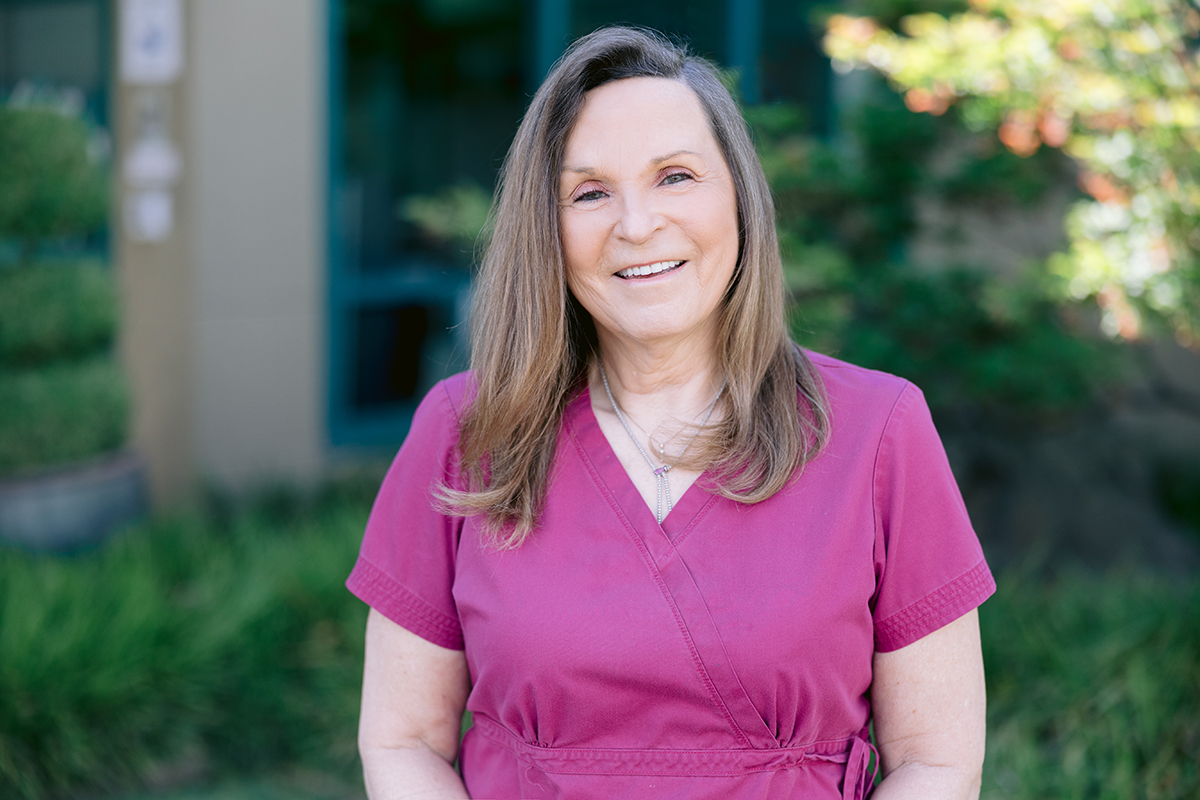Added Energy, Better Health: A Nurse’s Weight-Loss Story
Jan 17, 2024

In a crisis, Jenny Azevedo wastes no time — she acts swiftly. She’s a charge nurse at Adventist Health Portland’s emergency room, where she saves lives, calms anxious families and helps people navigate some of their toughest times.
So when Jenny’s own health reached a critical point, she knew she had to make a major change.
“I’ve always been a bigger person and carried extra weight,” she says. “I’ve tried pretty much every diet out there but nothing seemed to stick with me. I’d lose a little, and then I’d just yo-yo, up and down. Finally, when my highest weight was 302 pounds, I got to a point where I said enough is enough.”
At work, Jenny was feeling the effects of extra pounds. She’d get so fatigued, she’d drink lots of coffee and power drinks to perk up. On lunch breaks she’d take naps. Even at home, just trying to sleep, she couldn’t get comfortable. “I’d flip and flop, my hips would hurt, and my shoulders would hurt,” she says.
Perhaps most concerning, Jenny’s blood pressure was consistently high. That marker is linked to a host of health problems.
Jenny talked with her doctor about options, including weight-loss medications. Her doctor suggested she contact Oregon Health & Science University, an Adventist Health Portland partner, to see if she might qualify for weight-loss surgery.
“That springboarded things,” Jenny recalls. “I reached out to OHSU, took their online assessment tool and found out that, yes, I would likely be a candidate for weight-loss surgery. I was both relieved and a little bit nervous.”
The plan takes shape
Jenny met with her surgeon, Dr. Ryland Stucke, at Adventist Health Portland. He explained more about what the procedure would involve. Gastric sleeve surgery, it’s called, reduces the size of a person’s stomach to lower their food intake. It also helps reduce hunger signals to the brain.
“I didn’t make the final decision until after I met Dr. Stucke and got an in-person vibe with him,” Jenny says. “He’s great. He’s super nice and has such a great bedside manner. He and his team answered all my questions. They were very straight up with me about what to expect. Hearing the team’s support for Dr. Stucke, and how they talked about him in glowing terms, made me feel comfortable.”
Another part of Jenny’s presurgery plan was meeting with nurse practitioners, dietitians, physical therapists and psychologists. The goal, over several months, was to prepare physically and mentally for surgery and life afterward.
“The biggest thing they told me was to start thinking about healthier eating habits,” Jenny says. “I’ve always been a fast eater — I just shovel it in because I’ve gotta get back to work. I had to learn to eat slower. Many times I caught myself shoveling, and I thought, ‘Wait a minute. Chew those bites. Pay attention to swallowing.’ I even started setting a timer for eating. I’d try to finish a meal in 20 minutes instead of 10.”
Jenny’s medical team also gave her a binder full of information. Studying it helped her learn what to expect and what her daily life might look like before surgery and afterward.
“It was nice to have a timeline,” she says. “I could set myself up and stockpile certain things, like my favorite protein shakes.”
The support Jenny received from her sons, husband, friends and colleagues made a huge, empowering difference too. “They told me, ‘You are so strong minded, you’ll be able to do it.’”
Counting down
The months leading up to surgery seemed to stretch on, Jenny says, but the day of the operation flew by. A close nurse friend from work took her into the presurgery unit and stayed with her until surgery time. Others checked in and helped too.
“It was comforting being at the hospital where I work,” Jenny says. “I’ve been there for 17 years, I had my son there, and I know pretty much everybody. I’m comfortable there.”
The surgery, which Dr. Stucke performed robotically through four tiny incisions, took about an hour. Afterward, while Jenny was in recovery, Dr. Stucke checked on her.
During recovery, “the nursing staff, CNAs and support staff on the floor were really sweet,” Jenny says. “I wanted to go home as soon as I possibly could, so I was all gung-ho to get up and get out. They made it really easy.”
After one night and part of the next day in the hospital, Jenny was discharged. The pain wasn’t bad at all, and liquid Tylenol kept it under control. “I felt really comfortable after the fact, and everything healed nicely,” she says. “I had internal sutures and some glue on the outside, and everything looked great. I never had any issues with healing in that area, which was good.”
In the following days and weeks, Jenny took it easy. She took 10 days off work, avoided lifting heavy things, and only drank liquids for the first week. After that, she slowly tried a bit of soft food. “I’ll tell you, eating a little cottage cheese and an egg was amazing,” she says.
Since then, Jenny continues to lose weight steadily, a bit at a time. By eating wisely and exercising regularly, she’s coming close to her personal goal, which is to weigh less than 200 pounds. So far, from her highest weight at 302 pounds, she’s down to 212 and counting — down now, instead of up.
“I feel amazing,” she says. “It’s incredible to see my body change. One of the greatest things is being able to shop at a normal store again — not having to go to specialty stores and find ugly clothes and worry about them fitting. At my heaviest, I used to wear a size 22. Now I can wear a size 12 or 14 jean.”
At work, Jenny’s natural energy and stamina have returned. She doesn’t need power drinks, and she doesn’t nap on her lunch breaks. She used to drink four cups of coffee — now she has maybe one. Squatting down to reach low shelves doesn’t make her knees ache and pop now, and she can perform demanding tasks without sweating and getting exhausted.
At home, Jenny says it’s easier take laundry out of the dryer without having to wide-stance her legs or worry about her belly getting in the way. She’s sleeping better as the hip and shoulder pain have stopped.
Even her family members are taking note. Her preteen son joins her in strength-training exercises like lifting kettlebells. Her husband takes walks with the family. And everyone eats the turkey Jenny sneaks into meatballs in place of ground beef. “Better habits are spilling over into the whole family,” she says.
Passing it on
Jenny credits the medical experts who helped set her on a healthier path. “I have nothing but great things to say about Dr. Stucke and his team,” she says. “The program is absolutely amazing.”
For others considering weight-loss surgery, Jenny shares four main points of advice:
- Pace yourself. When deciding on weight-loss surgery, it’s important to conquer the inner head part, Jenny says. “I would say 90% of it is a head game,” she explains. “You really need to understand it and have a conversation with yourself about whether you’re ready. Research it, meet with the team and trust your gut.”
- Give yourself time.Make gradual eating and exercise changes. “You really have to pay attention not only to what’s on your plate, but what’s in your head and body,” Jenny says.
- Seek support. Whether it be with friends, family, co-workers or online support groups, look for ways to connect with others on your journey. Ask questions, be open about what you need, and lean on your support team for advice and encouragement. Use all the tools and resources they offer you.
- Go forward with confidence. In reality, obesity and the way people lose weight still has some stigma around it, Jenny says. But don’t let that stop you from making the right choice for your health. “You shouldn’t feel shameful because you’re doing something to save your life,” she advises. “It’s amazing, when you lose the weight and have better nutrition and health, how much better you feel.”
Take our free assessment and learn more about ourmetabolic and weight-loss surgery programto find out if you may be a candidate for surgery.
Related articles

Tulare resident finds relief and comfort in hometown hospital
June 26, 2020

Patient receives hospital care at home, surrounded by family and field nurses and directed by a physician
July 29, 2020

Lifesaving Lung Screening Helps Julie Enjoy More Breaths
October 2, 2024